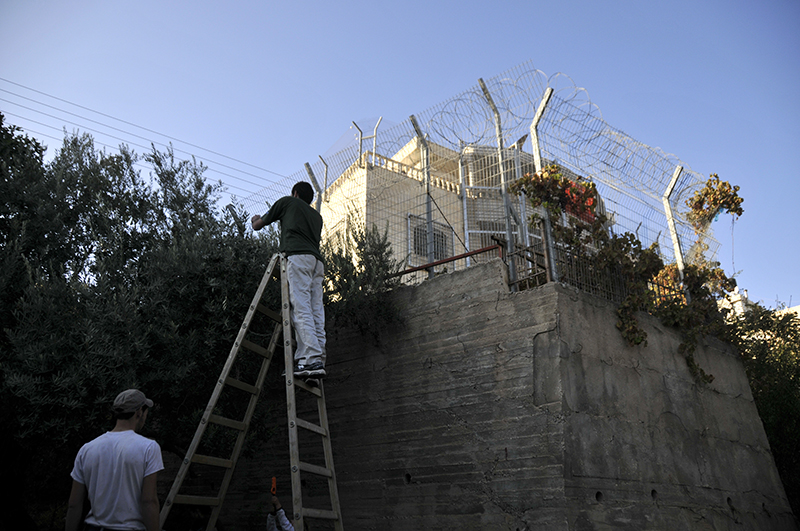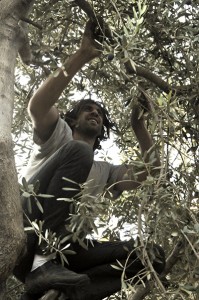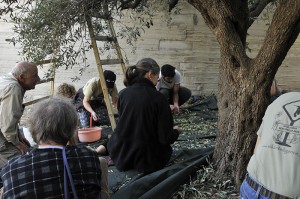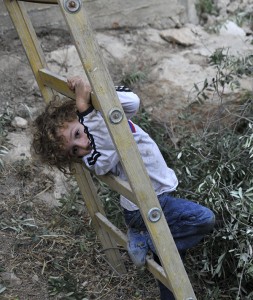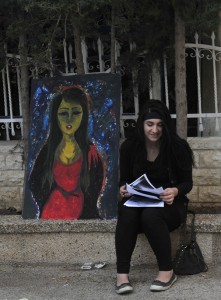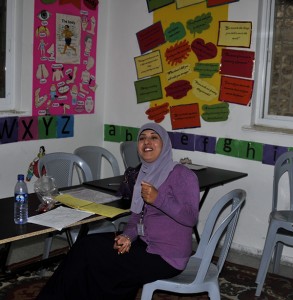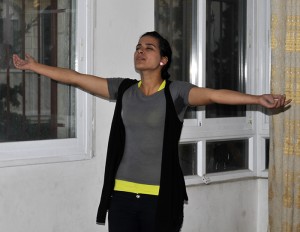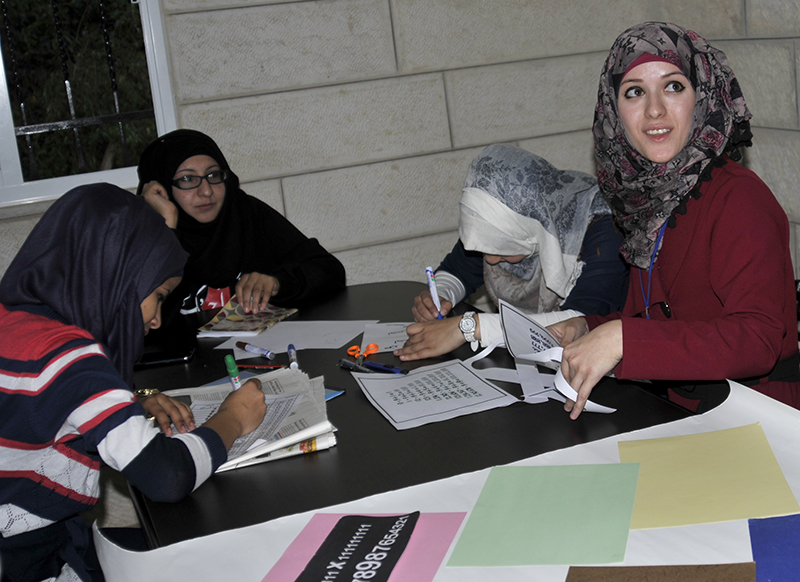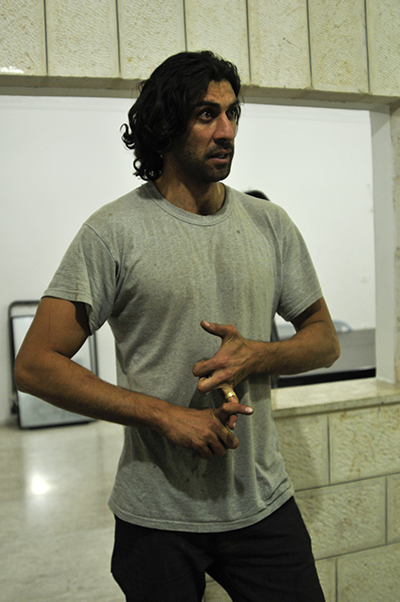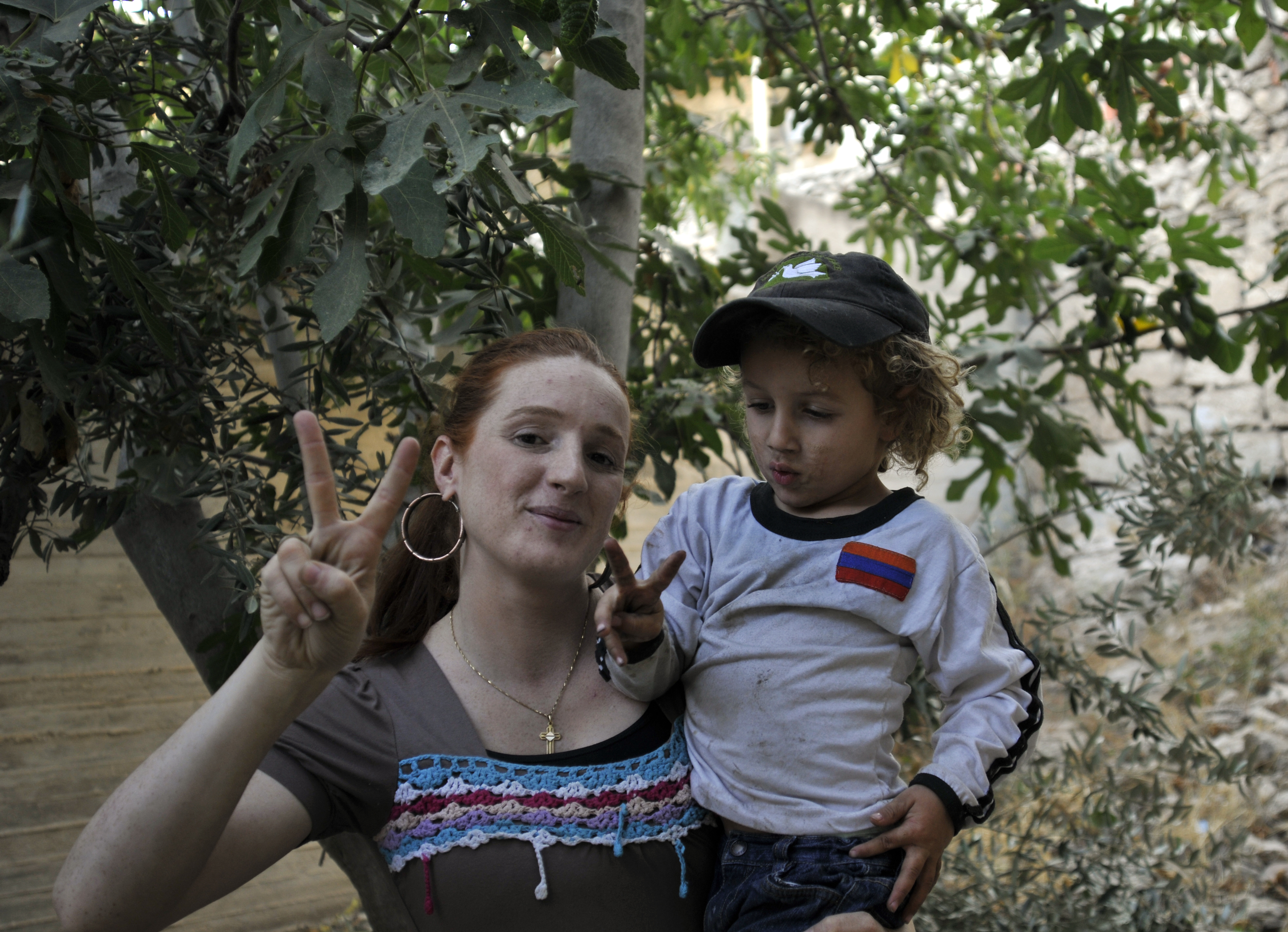Ellen Davidson is accompanying a delegation of U.S. military veterans in the West Bank. On the fourth day of their trip, they went to see the House of Hope, a Christian peace and education project in the town of Al-Azaria, near Jerusalem. Below is the report from November 10. See reports from November 7 and November 8.
By Ellen Davidson
The land and the olive trees are the center of many Palestinian families’ lives, so it’s not surprising that a visit with Milad Vosgueritchian and Manar Wahhab, who run the House of Hope in Al-Azaria in the occupied West Bank, begins on their family land picking the last of this year’s olives.
When we arrive, the family, including two of Milad’s brothers and his and Manar’s three-year-old son Nisham, are gathered under a 500-year-old tree that stands only a few feet away from the apartheid wall that Israel has been constructing in the West Bank. This wall, which Israel claims is for security purposes, wanders far from the 1967 border between Israel and the West Bank, enclosing a significant percentage of Palestinian land on the Israeli side. In this case, it runs straight through the community on the back side of the Mount of Olives, blocking the road that formerly led to Jerusalem. For those living in the houses on the other side of the wall, it is a five-minute car ride into the city, while from this side, it is a 30-minute drive that passes through an Israeli checkpoint.
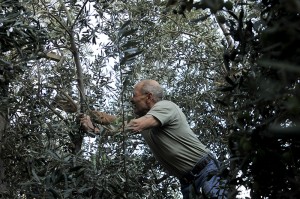
Veterans For Peace board member Tarak Kauff gets up in the tree to help out. Photo by ELLEN DAVIDSON
Blankets and sheets are spread on the ground under the tree, and Milad and his brother climb up into the tree and on a ladder to strip the olives off the branches onto the cloths below, where they are sorted by the others and placed in plastic bowls. We join in picking over the olives and keeping an eye on Nisham, who wants to climb up the ladder just like his daddy.
After the tree has been thoroughly picked over and we have been served coffee (there is no going to a Palestinian home without being offered something), we set off to see the House of Hope, the educational peace project that Milad and Manar oversee.
Before we even get inside the building, the organization’s profound focus on culture and the arts is apparent, as we find a young woman sitting outside poring over some photographs. Beside her on the curb is one of her paintings, a girl in a red dress with sad, soulful eyes, perhaps a self-portrait.
House of Hope’s vision is “to achieve freedom, independence and justice by increasing cultural awareness of Palestinian children, youth and women under occupation,” according to a promotional brochure. It offers classes and tutoring in English, math, drama, computer skills, calligraphy, drawing, gardening, singing, and dabka (traditional Palestinian dance), among other things. There are workshops with parents to discuss youth-related issues, and every month the children have a chance to show their parents what they’ve learned in public programs.
As we tour through the building, we encounter a young and very outgoing English teacher, a Hebrew tutor, and several girls in a room with the math instructor working on decorations for the classroom walls.
Milad, a Palestinian Christian of Armenian descent, says he feels grateful to be able to take on this work. “Jesus said that to be great, you have to serve, and it’s very important to put your life to work toward life,” he says. “This place, I’m very happy about it, because, instead of being violent, instead of being something bad in the street, at least you can spend part of your good life with people and with kids.”
“So our kids now, they are growing,” Milad continues, “and one day they will be the seeds for peace. We really feel that we touch the change.”
One particular emphasis is women’s empowerment. The drama teacher, says Milad, is passionate about the position of women in Palestinian society. He uses his classes to help them break out of their traditional roles. In the drama class we observe, five women walk silently to positions around the room. One says something angrily in Arabic. Then another. Then a man walks in front of one of the women and shouts something. “No,” interrupts the instructor, and he steps in front of the man, says his line quietly, and then repeats it angrily. “Now, from the beginning.” And the women resume their original positions.
Women’s employment options are very limited, and the center teaches practical arts, like secretarial and computer skills, that will help them become more independent. “Nowadays, we have many women who cannot make an income,” says Milad. “Islamic society is very conservative. A man cannot accept that his wife goes to a male barber to do her hair. So there are women that you can call to do your hair for a wedding or special occasion.”
Faten Bussa, an 11-year-old girl, said her family was “very reluctant at the beginning” to allow her to partipicate in House of Hope activities, but she finally convinced them, and, she says, “Now my brothers come to the center too. I enjoy attending music classes very much. The center has changed my life.”
House of Hope, now in its second year, has been funded for its first three years by the Japanese Ministry of Foreign Affairs, but Milad and Manar are worried about finding financing to continue the project when the Japanese support, which comes through Kokkyo naki Kodomotachi (Children Without Borders), ends. “My worst fear is what will happen after one year,” says Milad. “We are trying to write proposals, but this project takes $1 million.”
One unique aspect of House of Hope’s work, Manar stresses, is that the center places children with special needs together with the regular student population. She says most schools here won’t accept children with learning and other disabilities and many such children end up being cared for at home, so they never get an education.
Milad cites an example of one Bedouin boy: “He was so aggressive, and even though he was a Palestinian Bedouin, no one accepted him, because he smelled bad, he was born in a tent, with sheep beside him, and the life of a Bedouin, it’s not an easy life. When he came here, all the other kids rejected him. But imagine! Through drama, he became a good actor, he became a good dancer, he was a genius guy, and the stereotype about him changed, and he became a beautiful actor.”
The center’s staff of 22 full- and part-time workers serves between 200 and 500 children, depending on the time of year. ”In the summer, we have a lot,” Manar says. “We have summer school, and we can reach 300 kids every day.”
“We try to bring Palestinians and Israelis together,” Milad stresses. “It’s very important that Israelis can live as Palestinians for a while so that they can understand. The Israelis say that the security phobia can kill a man, can turn the dream of man into hate, but part of our dream that is we have to work hard to change. You can’t win by teaching hate.”
Ken Mayers, a member of the Veterans Peace Team visiting the center, remarked “Forty-five years ago I was involved in helping set up a Community Action Agency in West Berkeley, California, called Ghettos Inc. Our orientation to the community and its needs was strikingly similar to that of House of Hope. Having faced those challenges,” he went on, “I am tremendously impressed by what Milad and Manar have accomplished. The House of Hope is indeed a source of hope for the future.”
“If you’re going to preach about peace, it’s important to use many tools,” Milad emphasizes. “It’s important to draw a wall, but you can draw a house without a wall, so when you draw a wall, what will it give the child? When I walk beside the wall, I look at it as beautiful, because I was forced to accept the wall, but psychologically, it kills me. But to survive, to have hope, to continue, I have to pass beside it as if there is no wall. That is part of my test. But most people, they cannot do it, because they see the wall as a monster. But you cannot change it, so our people should be well prepared. Our fight with the Israeli people, it’s not a fight of flesh and blood at all. I call it a peaceful fight. I want Palestinians to be guitarists, breakdancers, artists, musicians, poets. They have to sing.”

